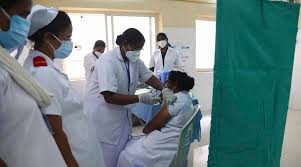UNITED NATIONS, Jan 20: As India launched the world’s largest COVID-19 vaccination drive, several UN agencies are working closely with authorities for the massive vaccination programme, a spokesperson for the UN chief has said.
In India, the UN team led by Resident Coordinator Renata Dessallien is supporting the government and UN partners in the massive COVID-19 vaccination programme, said Stephane Dujarric, Spokesman for Secretary-General Antonio Guterres on Tuesday.
“UN agencies are working closely with authorities to prepare and launch what is currently the world’s largest vaccination drive,” he told reporters at the daily press briefing, adding that as of Tuesday, the Indian government has vaccinated nearly half a million people.
India on January 16 rolled out the massive coronavirus vaccination drive under which two domestically manufactured vaccines — Covishield and Covaxin –are being administered to frontline health workers across the country.
While Oxford-AstraZeneca’s Covishield is being manufactured by the Serum Institute of India, the Covaxin is being produced by Bharat Biotech.
So far a total of 4,54,049 vaccinations have been done, according to data from India’s Ministry of Health and Family Welfare. There have been about 580 cases of adverse effects following the vaccinations so far and two people have died. The government has said the deaths are not related to the vaccine.
Dujarric said UN teams have monitored more than 4,000 vaccination sessions so far and have helped to train more than 300,000 vaccinators and healthcare workers.
“We are also providing technical assistance, including helping to ensure cold-chain equipment for the vaccines,” he said.
In India, the UN team’s work has led to a five-fold increase in investments to address gender-based violence since the start of the pandemic, he added.
UN agencies have helped to train hundreds of crisis centre workers who support thousands of survivors of gender-based violence every month.
“We have also trained 47,000 nurses and others to address violence against women, girls and others,” Dujarric said.
UNICEF (United Nations Children’s Fund) has helped nearly half a million children in institutions and foster care.
“We have also helped nearly 5 million children and women receive health care,” Dujarric said, adding that the UN has trained law enforcement agency officials to prevent and counter human trafficking.
A campaign by UNAIDS (a joint United Nations programme against HIV/AIDS) to build solidarity for the LGBTQI community has reached millions of people.
India has over 10.5 million COVID-19 infections, the second highest in the world after the worst-hit US with over 24 million cases and more than 400,000 deaths. The virus has claimed over 150,000 lives in India.
WHO representative in India, Roderico Ofrin, said the World Health Organisation has provided technical assistance to the government for the development of operational guidelines and other training materials for state and district programme managers and vaccinators, and establishing tracking and accountability frameworks, according to a UN news release.
Ofrin said WHO field officers have facilitated the highest-level oversight through regular task force meetings at state and district levels, which are chaired by the principal secretaries (Health) at the state level and district magistrates at the district level.
Prior to the start of the campaign, UN agencies help with detailed preparations, the release said.
For its part, WHO participated in dry-run simulations and provided feedback on management of vaccines, registration of beneficiaries, as well as reporting on vaccination coverage and adverse events following immunisation. It also worked with the government and the UN Development Programme on real-time reporting and problem-solving when issues arose at the vaccination sites, Ofrin said.
At the provincial level, WHO supported implementation and monitoring of health policy, such as developing standard operating procedures, preparing technical briefs, and providing best practices from other parts of the India as well as other countries.
Similarly, UNICEF supported communication and advocacy efforts to ensure the dissemination of factual information to stakeholders and communities. Over the months, the agency also helped train healthcare staff in infection control and prevention, and psychosocial support to children and caregivers, the release said. Aside from directly supporting the vaccine rollout, UN agencies continued their programmes to assist the most vulnerable communities impacted by COVID-19 and its socio-economic fallouts.
Though vaccination programmes are underway, continued vigilance against COVID-19 and preventing its spread remain as important as ever, the UN said.
Ofrin urged continued vigilance over tracking cases, cluster investigation, isolation and clinical care, and quarantining to break the chain of transmission.
Alongside, he also highlighted the “three W’s — wear a mask, wash your hands and watch your distance” to stop the spread of COVID-19.
India on Tuesday announced that it will send COVID-19 vaccines under grant assistance to Bhutan, Maldives, Bangladesh, Nepal, Myanmar and Seychelles from Wednesday and supplies to Sri Lanka, Afghanistan and Mauritius will commence after confirmation of necessary regulatory clearances. (PTI)
Home International UN agencies working closely with India as country launches world’s largest COVID...


